Losing Life on Earth
Air Date: Week of March 30, 2018
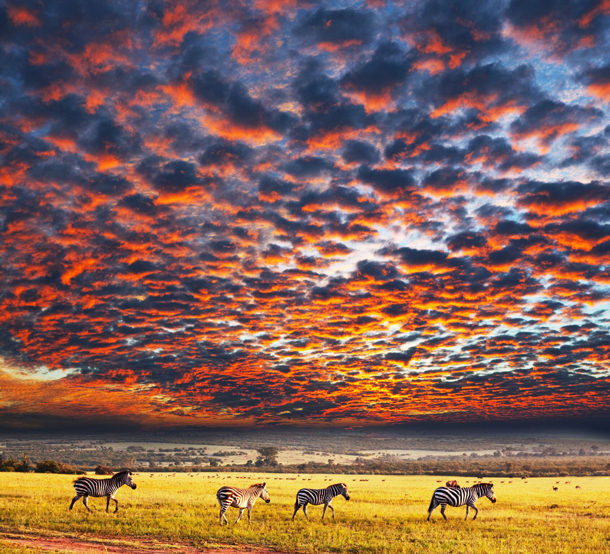
The UN’s IPBES report looked at biodiversity issues in every region of the world. (Photo: Galyna Andrushko/Shutterstock.com)
A sharp decline in biodiversity is affecting every region of the world, the United Nations reports. A three-year study finds that land degradation is leading to a loss of ecosystem services with profound implications for humanity, putting billions of people at risk of going without adequate food, water, and energy. Host Steve Curwood talks with Sir Robert Watson, chair of the Intergovernmental Science-Policy Platform on Biodiversity and Ecosystem Services, about the report’s scope and possible solutions.
Transcript
CURWOOD: It’s Living on Earth, I’m Steve Curwood. The last male Northern White Rhino recently died, and with just two females left alive, the species is functionally extinct. But that loss is just a tiny part of rapidly declining biological diversity according to a new report from the United Nations. It’s the result of three years study and four regional assessments that cover the whole globe, and tries to explain why biodiversity is important, documents the main threats and suggests paths to a more sustainable future. Sir Robert Watson is the chair of the Intergovernmental Science-Policy Platform on Biodiversity and Ecosystem Services, which put the report together, and he joins me now. Welcome to Living on Earth!
WATSON: Thank you very much.
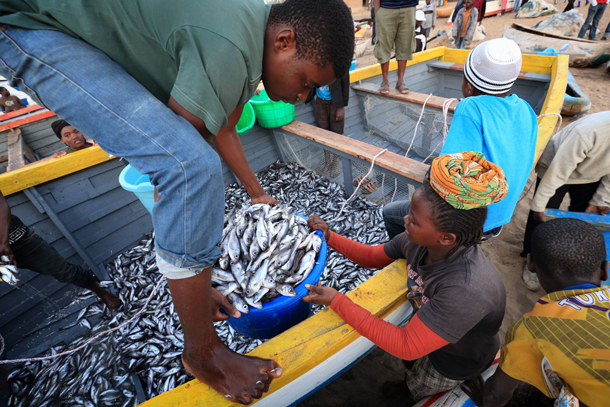
The UN’s IPBES report finds that food security will be a critical issue particularly in developing countries as ecosystems are degraded. (Photo: Dietmar Temps/Shutterstock.com)
CURWOOD: So, from all of your meetings and all these reports, what's the one thing that we need to know right now?
WATSON: The one thing the world needs to know is that we are degrading nature and it's undermining human wellbeing. Our ability to supply food, clean water, energy, and so as we continue to degrade our environment, it's not just an environmental issue, it's also a development issue.
CURWOOD: So, how serious is the scale of biodiversity loss right now as you detailed in this latest report?
WATSON: It's significant. We're losing species at an unsustainable rate, more than 1,000 times the natural rights of evolution. We are degrading our forests across the world, our coral reefs are degrading, our mangrove swamps. So, we're losing species. We're losing not only certain species that may go extinct, but the populations of species are going down. So, if you're in America and you walk through our forests today, it would have actually 30 percent fewer butterflies, birds, animals, plants, and by 2050 it would be 40 percent less. So, we really are changing our ecosystems quite substantially.
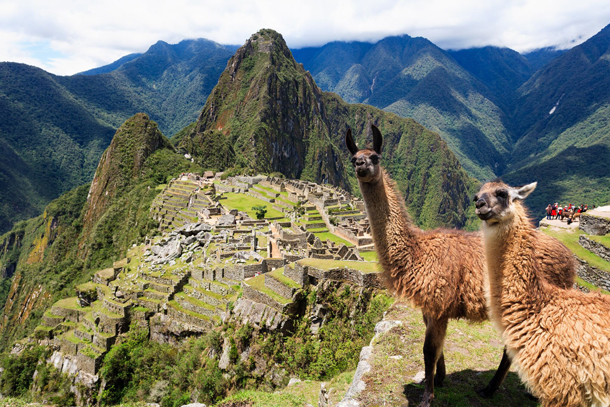
Urubamba Province, Machupicchu District, Peru. (Photo: Marnix Foeken/Shutterstock.com)
CURWOOD: Now, as I understand the report, it was really a study of studies. Tell me a bit about its scope.
WATSON: Yes, we've done actually five studies here, four regional, subregional. So, the Americas and the subregions within the Americas, Asia and the Pacific, Africa and Europe and Central Asia. So, we looked right across the issues from a regional, subregional, and we did the global assessment on land degradation.
CURWOOD: Now, of course humans are but one species among the literally millions on this planet, but why is the loss of biodiversity so concerning to people at this point?
WATSON: If we lose biodiversity and we degrade our ecosystem, we're degrading our soils, we're polluting our waters and therefore as you do degrade soils, as you pollute the waters, it makes it harder to have food security, harder to have water security, as we degrade the land, you get effects in the ocean, our rivers are polluted, our lakes are polluted, the coastal zones are polluted, which again affects freshwater fish, coastal fish, etc. So, as we degrade our natural world, we actually have impacts on what many people really need: food, water.
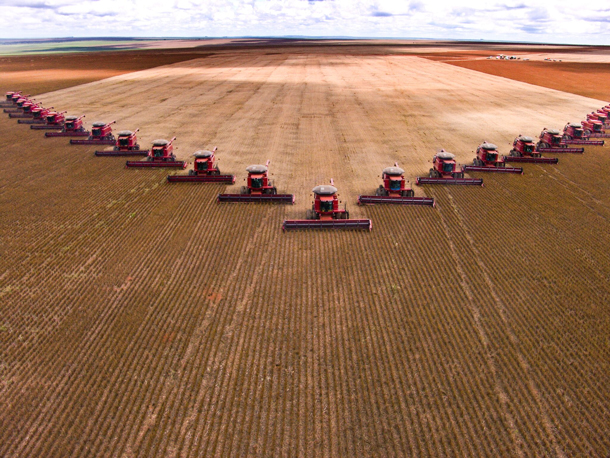
A soybean plantation in Mato Grosso, Brazil was once part of the Amazon rainforest, one of the richest biological regions on earth. (Photo: Alf Ribeiro/Shutterstock.com)
CURWOOD: Now, so what are the driving forces of biodiversity loss these days?
WATSON: The big one today all over the world is the land use change. We've converted our forests, our grasslands, our mangrove systems into agricultural fields, which we've needed, of course, for the food that we need. So, land use change is the major change, and unfortunately when we've converted our land into agricultural systems, many of those aren't sustainable. We're producing more food, but we've got heavy use of chemicals, sometimes overuse of chemicals in many parts of the world, so that's leading to degrading our soils. Those chemicals leach into the rivers. That's affecting our freshwater systems, rivers and lakes.
So, land use change is the biggest, but also there is straight pollution of our ecosystems. There's invasive alien species and a threat that is already emerged, but will only become even more important in time is climate change, and in fact what we've said is land use change is the biggest threat to date, but by 2050, in most ecosystems around the world, climate change will be an equally important threat. Therefore, we have to look at climate change and biodiversity together. They are both environmental, social, economic and development issues.
CURWOOD: I want to ask you about one particular area that your organization has looked at, and that's the loss of pollinators. What's going on there?
WATSON: Yes, we issued a report about a year ago on pollinators, and it's quite clear that wild pollinators are decreasing in many parts of the world. And what we're trying to look at is why might that be. Could it be possibly that we are using too many chemicals, especially things like pesticides, neonicotinoids? With managed honeybees – which is very important to complement the wild bees – were the beehives healthy, as we degraded our natural ecosystems, were there flowery areas amongst the monocultures of agriculture? So, we looked to see to what degree pollinators were being lost, to what degree did pollination services affect food production, and we talked about the various possibilities of how we might sort of halt the decline of pollinators and hopefully even reverse them. So, pollination is crucial to indeed food production, and that was a report we issued about a year ago.
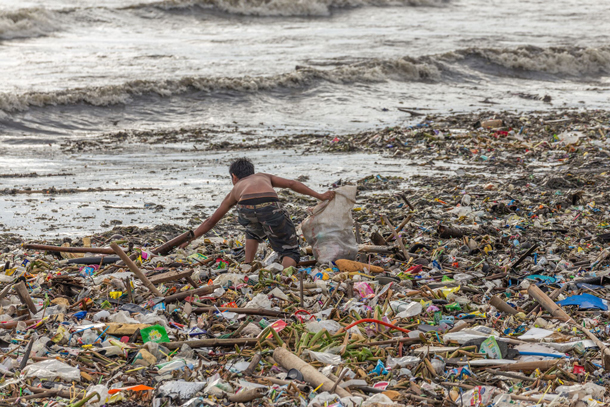
Land degradation is causing a rapid decline in biodiversity and making it difficult for communities that depend on a healthy environment to make their living. (Photo: szefei/Shutterstock.com)
CURWOOD: What's the relationship between biodiversity loss and population growth, do you think?
WATSON: Well, there's no question, two major factors. The more people we have on the Earth and the richer they are, the more they can demand resources. There's more demand for food, more demand for water, more demand for energy. So, indeed it's the combination of numbers of people and the ability to purchase. So, there's no question the threats on the Earth today are far more than, say, 50 years ago and in 50 years time, there will even be more threats. So, the challenge we have is how can we meet the food needs, the water needs, the energy needs, in a way that doesn't destroy biodiversity and nature.
CURWOOD: And so, talk about the relationship between our economy and the loss of biodiversity?
WATSON: Well, there's no question, biodiversity is an extremely important part. What they showed in the Americas, for example, is the value of biodiversity and our ecosystems is roughly equal to the GDP of the Americas, something like 24 trillion dollars a year. What we also said in the land degradation report, is the land degradation to date has probably depressed the global economy about 10 percent, that is to say, if we had not degraded our systems, the economy would be 10 percent larger than it is today. When you look at the effect on the economy, very many people immediately think of what I call the market value of food and water, but there's a huge economic value in the way the biodiversity, nature, regulates our climate, regulates pollution, regulates our pollination services, storm surges to protect the coast from sea level rise.
CURWOOD: So, how do you think the trend of biodiversity loss is going to proceed as more and more of us live in cities?
WATSON: Urbanization is another major issue, so in land use change, which has actually underminded nature, it's not just the conversion to agriculture. It is indeed our roads, our cities. Also in the UK, for example, if you effectively look at the English landscape, it looks very nice. But that's because 40 percent of the food in the UK comes from other parts of the world, which are being degraded. So, there's a little bit of a disconnect between people, where they buy their food and where nature is being degraded. We need sustainable production of food, water and energy and sustainable consumption. That means the individual can also play a big role here. Don't waste food. Have a more appropriate balanced diet, and don't waste water, don't waste energy, less pressure on nature.
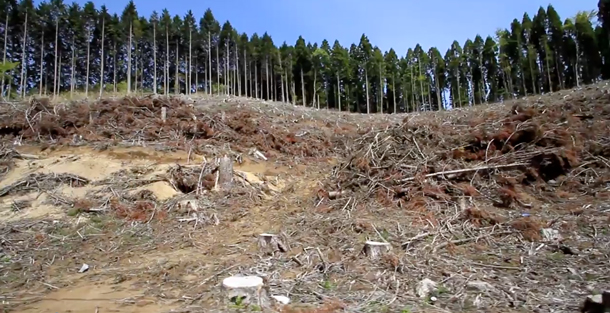
The UN report says land use change is the number one driver of biodiversity loss today. (Photo: IPBES)
CURWOOD: Well, so what should governments be doing? And what about civil society?
WATSON: The public, once they realize that biodiversity loss is not simply an environmental issue, is a social, economic, and development issue, they should be putting pressure on governments and on the private sector. We want a sustainable future, so governments should put in place appropriate energy policies to stimulate a transition to a low-carbon economy, getting rid of fossil fuels and using renewable energy, putting policies in place. So, we're actually more effective in the way we use our energy, stimulate mass transportation, so we don't all have to use an individual car, we do have mass transportation.
Also, put in place policies that are going to help the farmer become more sustainable. So, there's a lot of things. Government is in charge of largely stimulating policy, educating the public about these issues. Private sector in the long-term needs to be sustainable, and most private sector either need nature to be profitable or they put a footprint on nature. So, the private sector needs to take both the biodiversity issue and the climate change issue very seriously.
CURWOOD: Robert Watson, what gives you hope?
WATSON: Well, I suppose what gives me hope is the fact that over the last, you know, four, five, six years, governments have actually done three things that's very important, but in biodiversity, they have the so-called Aichi targets. They have 20 targets for how to protect biodiversity. We've got the Paris Agreement that was negotiated recently that says we should try and limit the change in the Earth's climate to no more than two degrees Celsius and hopefully 1.5, and the world agreed on 17 sustainable development goals, that go from energy security, water security, gender equality, leave nobody behind. So, I think there is a recognition of the importance of environment and development, but the actions to date are inadequate.
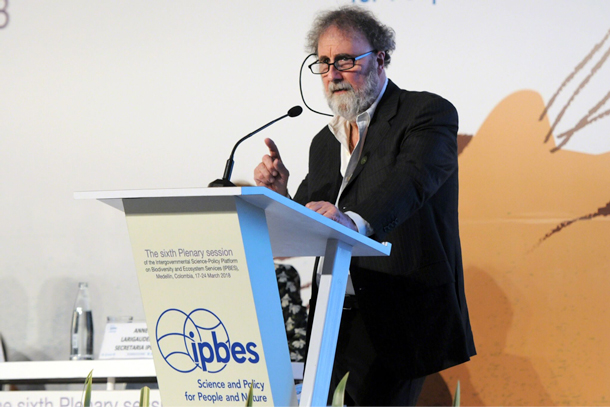
IPBES Chair Sir Robert Watson. (Photo: IISD/ENB, Natalia Mroz)
Governments and the private sector have to be much more sustainable. The pledges under the Paris Agreement are not adequate to meet the two-degree target, they have to be doubled and redoubled. We need to do a much better job of managing our forests, a much better job of managing our agriculture. So, there's a good realization of what is needed, but we're falling short of implementation at the moment. But as our reports show, we can do much better with the current knowledge, we can use technologies better, we can develop policies, we can have behavior change, so there is at least a recognition of the problem; we now have to implement.
CURWOOD: Robert Watson is chair of the Intergovernmental Science-Policy Platform on Biodiversity and Ecosystem Services. Sir Robert, thanks so much for taking the time with us today.
WATSON: And thank you for allowing me to talk with you.
Links
IPBES: Science-Policy Platform on Biodiversity and Ecosystem Services
IPBES: Biodiversity and Nature’s Contributions Continue Dangerous Decline, Scientists Warn
Living on Earth wants to hear from you!
Living on Earth
62 Calef Highway, Suite 212
Lee, NH 03861
Telephone: 617-287-4121
E-mail: comments@loe.org
Newsletter [Click here]
Donate to Living on Earth!
Living on Earth is an independent media program and relies entirely on contributions from listeners and institutions supporting public service. Please donate now to preserve an independent environmental voice.
NewsletterLiving on Earth offers a weekly delivery of the show's rundown to your mailbox. Sign up for our newsletter today!
 Sailors For The Sea: Be the change you want to sea.
Sailors For The Sea: Be the change you want to sea.
 The Grantham Foundation for the Protection of the Environment: Committed to protecting and improving the health of the global environment.
The Grantham Foundation for the Protection of the Environment: Committed to protecting and improving the health of the global environment.
 Contribute to Living on Earth and receive, as our gift to you, an archival print of one of Mark Seth Lender's extraordinary wildlife photographs. Follow the link to see Mark's current collection of photographs.
Contribute to Living on Earth and receive, as our gift to you, an archival print of one of Mark Seth Lender's extraordinary wildlife photographs. Follow the link to see Mark's current collection of photographs.
 Buy a signed copy of Mark Seth Lender's book Smeagull the Seagull & support Living on Earth
Buy a signed copy of Mark Seth Lender's book Smeagull the Seagull & support Living on Earth

